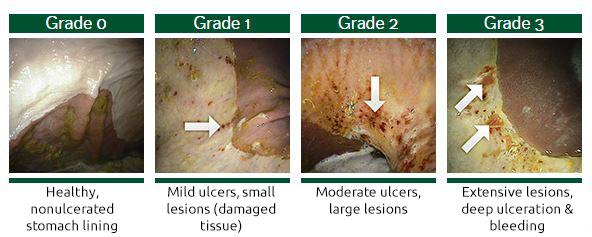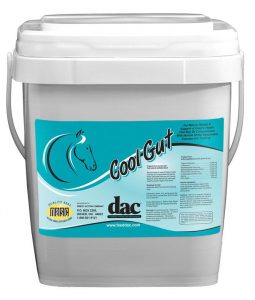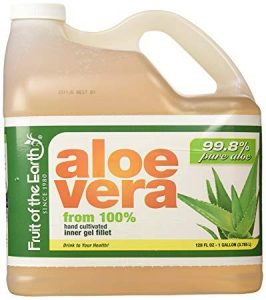
Comparison Review: Gastric Ulcer Prevention Supplements
If you’re looking to prevent gastric ulcers, this review of common options on the market may be helpful.
Gastric ulcers are one of the most frustrating health problems in horses. Ulcers can be the start of a rapid downward spiral beginning with poor appetite and leading to poor nutrition, resulting in a dull coat and hoof abscessing — not to mention the drastic weight loss that can accompany them. Once this ugly beast is tamed with medical management such as Omeprazole, prevention is the key to keeping a happy tummy.
Preventing ulcers from reoccurring can be costly and taxing, so rapidly finding the right regimen is imperative.
Three areas we note when choosing a preventative ulcer product are:
- Cost efficiency
- Effectiveness
- Appeal to the horse
After testing these five products, we have reviewed them according to the above criteria. We also noted how different the components are to each one.
1. DAC Cool Gut
Summary: DAC Cool Gut is a pelleted supplement that has 425mg/3oz of DHA, 10,000mg of Calcium Carbonate, 10,000mg of L-glutamine, and 1,00g of glycine.
Pros: DAC Cool Gut is one of the only supplements on the market that supports both the foregut and hindgut. It is also one of the most cost effective options, selling for $39.99 for a 27 day supply.
Cons: This product, because of its pelleted consistency, is hard to get a horse to ingest if she has no appetite or is a picky eater. It’s also not the most effective of the five listed. After coaxing two ulcer prone horses to eat this pellet for approximately 14 days, we saw no change in one of the horses and the second horse started to show signs and symptoms of ulcers while using this product as a prevention aid.
If you’d like to purchase this product click here.
2. MVP Gastroplex
Summary: MVP Gastroplex is a paste supplement that has 4000mg of gelatin, 350mg of L-glutamine, 2000mg of glycine, and 1,120mg of mannose.
Pros: MVP Gastroplex is highly effective, showing improved eating habits after just one dose. Both horses that this ulcer prevention supplement were tried on had increased intake and a more subtle girth response after one dose. Because of its paste consistency, it is easy to give to your horse if she has a decreased appetite or is picky with supplements.
Cons: This product is the most expensive of the five tested. It is $11.75 a tube, which consists of two doses. It would be $176.25 for a 30 day supply.
If you would like to purchase this product click here.
3. Fruit of the Earth Aloe Vera Juice
Summary: Fruit if the Earth Aloe Vera Juice is 99.8% Aloe Vera. It is not a significant source of dietary fiber or calcium.
Pros: Fruit of the Earth Aloe Vera Juice is by far the cheapest prevention option and the easiest to get your hands on. You can pick it up at your local Walmart for $6.44 for 128 oz. One container is a 16 day supply if you feed 8 oz a day, making a month supply $12.88. Its liquid consistency also makes it easy to pour on your horse’s feed or place in a syringe and to give it orally.
Cons: The Aloe Vera juice isn’t as effective as other options and is really dependent on the horse. Some horses respond well to this kind of prevention while others show little response to it. After using this method for 30 days, both horses regressed from baseline and showed discomfort at the girth area.
If you would like to purchase this product click here.
4. Finish Line U-7 Gastric Aid
Summary: Finish Line U-7 Gastric Aid is a liquid supplement that consists of 440mg of ascorbic acid per serving, 280mg of MSM, and 5mg of zinc gluconate.
Pros: Finish Line U-7 Gastric Aid is highly effective and enticing to horses even with decreased appetite. Even the pickiest of eaters tend to ingest this and if a horse turns her nose to it, it’s easy to draw up in a syringe and administer orally. After using this supplement on four horses, every horse in the barn exhibited better eating habits and less discomfort in the girth area. Currently, two of the four horses have not needed an ulcer supplements after 30 days and the other two currently continue to receive this supplement to prevent ulcers. This supplement is also easily accessible and can be picked up at your local Tractor Supply Company.
Cons: This product is more expensive at $44.99 for a 64oz bottle. If giving the recommended dose of 4oz per day, it’ll be $89.98 for a monthly supply.
If you would like to purchase this product click here.
5. Purina Outlast
Summary: Last, but surely not least, is Purina Outlast. Purina Outlast is a pelleted supplement comprised of 13% crude protein, 1.1% fat, 17% fiber, and 4-5% calcium.
Pros: Purina Outlast is highly effective and has data and research to back up its effectiveness. It’s appealing to even the pickiest of eaters and can be given multiple times a day as snacks, making it easy to ingest. Purina Outlast is also a supplement that won’t break the bank. It’s $39.99 for a 40 pound bag. If you feed the minimum of 8 oz per day, one bag gives you an 80 day supply. If you feed the maximum recommendation of 32 ounces per day, one bag gives you a 20 day supply.
Cons: The only con we’ve found with this product is if your horse does not like it, it’s difficult to get her to ingest it.
If you would like to purchase this product click here.
As with any issues concerning your horse’s health, make sure you are communicating with your vet to determine an appropriate course of action. Go riding!















Leave a Comment